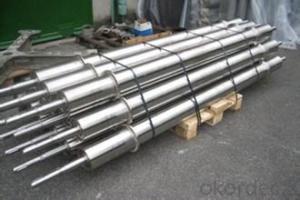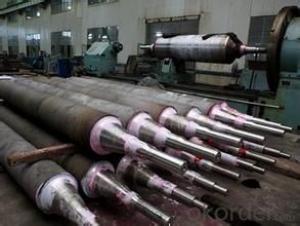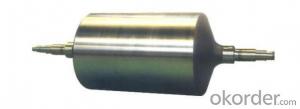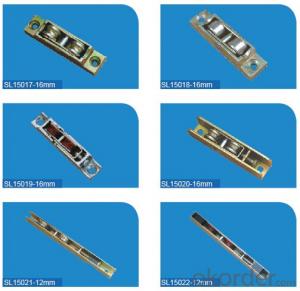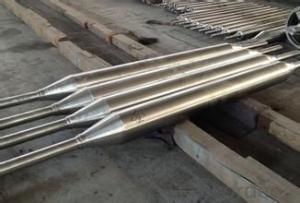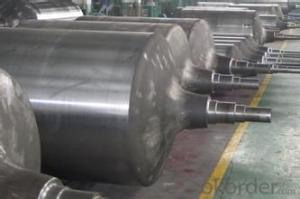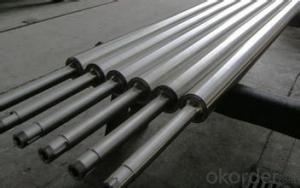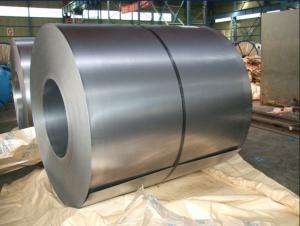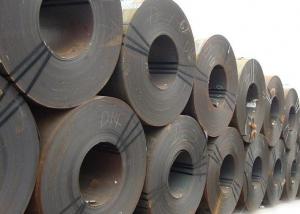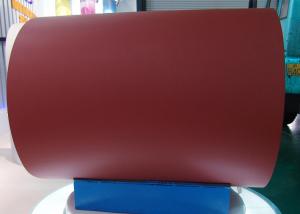Furnace Rolls With good quality
- Loading Port:
- Tianjin
- Payment Terms:
- TT OR LC
- Min Order Qty:
- 1000 PCS
- Supply Capability:
- 10000 PCS/month
OKorder Service Pledge
OKorder Financial Service
You Might Also Like
Quick Details
| Condition: | New | Type: | Resistance Furnace,heat treatment furnace | Usage: | Sintering Furnace |
| Place of Origin: | China (Mainland) | Brand Name: | Model Number: | RVS | |
| Voltage: | 380-440V adjustable | Power(W): | 100-950KW | Dimension(L*W*H): | up to deferent capacity |
| Weight: | 16-50 tones | Certification: | CE ISO 9001:2008 | Warranty: | 1 year quality warranty |
| After-sales Service Provided: | Overseas service center available | modle: | vacuum furnace |
Packaging & Delivery
| Packaging Detail: | standard exporting packing or acccording to your request |
| Delivery Detail: | 45 days after getting order conformation |
Specifications
High pumping capacity
High vacuum
Good temperature uniformity
No leakage
Centrifugally Casting Metallurgical furnace roll for CAL, CGL, and cold mill line
Materials | Barrel: wear-,heat-,and corrosion-resistant alloy steel, such as ZG35Cr24Ni7SiNRe, ZG40Cr25Ni20Si2, 1Cr18Ni9, ZGCr25Ni35Nb, ZGCr28Ni48W5 HK40, HT, HU, HH, 22H, 304, super 22H, HPNb, More1, More2, 1.4848, 1.4855, 1.4852, 2.4879, 1.4460, 1.4462, S32205, S32750, etc. Cone: similar/equal to barrel Shaft: 16Mn,1Cr5Mo, SUS304, SUS310, EN8, EN24 etc. |
Process
| Body is centrifugal casted and machined subsequently Cones will be made by static casting or precision casting Shafts will be forged, welded and machined according to relevant drawings |
| Specification | Out diameter: 50 to 2000mm or customized Thick: 8-50mm Length: 2000-6000mm |
| Welding consumables | AWS A5.11 NiCrFe-3 2.4807 or 182KS Similar to or higher than base material or as per the buyer's requirements |
| Test | Each piece has to go through our strict inspection, VT, PT, UT, LT, RT, MT, or according to customers' needs |
| Application | 1. heat resistant alloy tubes are mainly used in petrochemical, metallurgary, steel and heat resistant industries. 2. corrosion resistant alloy tubes are used in pulp and paper, chemical, nuclear, power, and other petrochemical industries. 3. super-alloys are used in high strength, carburization resistance industry. |
| Working temperature | depending on the materials (max 1300°C) |
- Q: What are the different types of steel beams used in building structures?
- There are several types of steel beams commonly used in building structures, including I-beams, H-beams, and wide flange beams. I-beams, also known as W-beams, have a cross-section shaped like the letter "I" and are commonly used in residential and commercial construction. H-beams, also known as H-shaped beams, have a cross-section shaped like the letter "H" and are often used in bridge construction. Wide flange beams, also known as W-flange beams, have a wider flange than I-beams and are commonly used in industrial and commercial construction.
- Q: How is steel used in the construction of stadiums and arenas?
- Steel is used extensively in the construction of stadiums and arenas due to its strength, durability, and versatility. It is commonly used to create the structural framework of these large structures, supporting the weight of the roof, seating areas, and other components. Steel is also used for the fabrication of beams, columns, and trusses, providing the necessary stability and load-bearing capacity. Additionally, steel is utilized for the construction of stairs, walkways, and various architectural features. Overall, steel plays a crucial role in ensuring the safety, longevity, and aesthetic appeal of stadiums and arenas.
- Q: How do steel products contribute to the automotive aftermarket industry?
- Steel products play a crucial role in the automotive aftermarket industry by providing various components and parts that are essential for vehicle maintenance and repair. From body panels and chassis frames to engine parts and suspension components, steel is widely used due to its strength, durability, and cost-effectiveness. Steel products ensure the safety and reliability of vehicles, contributing to the overall growth and success of the automotive aftermarket industry.
- Q: How is steel plate formed into curved sections for architectural designs?
- Steel plate is formed into curved sections for architectural designs through a process called plate rolling. This involves passing the steel plate through a series of rollers, which gradually bend the plate to the desired curvature. The rollers apply pressure on the plate, causing it to deform and take on the desired shape. The process can be repeated multiple times to achieve the desired curvature, and the final result is a steel plate that is curved and ready to be used in architectural designs.
- Q: What are the common types of steel products used in the telecommunications industry?
- Some common types of steel products used in the telecommunications industry include steel poles, towers, and cabinets. These steel structures provide the necessary support and protection for telecommunication equipment and infrastructure.
- Q: How does steel pipe threading for fire sprinkler systems work?
- Steel pipe threading for fire sprinkler systems involves the process of cutting threads into the ends of steel pipes to create a secure and leak-proof connection. This threading is typically done using a specialized machine called a pipe threader, which cuts precise grooves into the pipe's outer surface. These threads allow the pipes to be joined together using fittings, such as couplings or elbows, to form a complete fire sprinkler system. The threaded connection ensures that the pipes are tightly sealed, preventing any water or pressure leakage, thereby ensuring the effectiveness of the fire sprinkler system.
- Q: What are the common uses of steel angles?
- Steel angles are commonly used in construction and engineering projects for various purposes. They are often used as structural supports and reinforcements in buildings and bridges. Steel angles are also utilized in the manufacturing of machinery, equipment, and vehicles. Additionally, they are commonly employed in the fabrication of frames, shelves, and brackets.
- Q: What are the advantages of using steel in the construction of sports stadiums?
- There are several advantages of using steel in the construction of sports stadiums. Firstly, steel is a strong and durable material that can withstand heavy loads and extreme weather conditions, providing long-term structural integrity. This ensures the safety of spectators and athletes. Additionally, steel is a flexible material that allows for large open spaces and unique architectural designs, providing an enhanced viewing experience for fans. Moreover, steel is a sustainable and recyclable material, contributing to environmental conservation and reducing the carbon footprint of the construction process. Lastly, steel is cost-effective, as it can be prefabricated off-site and easily assembled on-site, reducing construction time and overall project costs.
- Q: How is steel used in the production of laboratory equipment?
- Steel is used in the production of laboratory equipment due to its exceptional strength, durability, and resistance to corrosion, making it ideal for manufacturing various tools and instruments used in scientific research and experimentation.
- Q: How is steel tubing used in the production of furniture?
- Steel tubing is commonly used in the production of furniture to provide structural support and stability. It is often used for the frames of chairs, tables, and other pieces of furniture to ensure durability and longevity. Steel tubing also allows for versatile designs and can be bent or molded into various shapes to meet the desired aesthetic and functional requirements of the furniture.
Send your message to us
Furnace Rolls With good quality
- Loading Port:
- Tianjin
- Payment Terms:
- TT OR LC
- Min Order Qty:
- 1000 PCS
- Supply Capability:
- 10000 PCS/month
OKorder Service Pledge
OKorder Financial Service
Similar products
Hot products
Hot Searches
Related keywords
